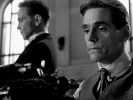Eye For Film >> Movies >> Kafka (1991) Film Review
Kafka is the second feature directed by American part-time auteur, part-time studio ATM Steven Soderbergh. His first collaboration with writer Lem Dobbs (the two would soon work together again on The Limey), the film blends facts from celebrated Czech novelist Franz Kafka's life with elements taken from his fictional work.
The novels most heavily drawn from here are The Trial and The Castle, both tales of a single man's struggles with insurmountable bureaucracy. As Kafka once claimed that he wrote only about himself, this seems an appropriate move and one that works startlingly well. Boldly shot in black and white and partly on location in Prague, an atmosphere of dark mystery with a hint of absurdity is established from the very opening strums of Cliff Martinez's zither score, played against a visual collage of gothic spires and grimacing stone gargoyles.

Kafka is an office clerk in an insurance firm where has spent the past seven years favouring his relationship with work over those with people. This all changes when the closest thing Kafka has to a friend is found dead, fished out of the Vltava river with suspicions of foul play. Personal investigations into the death lead Kafka to stumble across a covert terrorist cell, bent on bringing an end to the hypocritical and insidious rule of the Castle over the town and its people.
Repelled by the group's methods and ideals, Kafka is nonetheless drawn in to their world thanks to an alluring female member and he becomes more determined than ever to discover the truth behind the Castle's mysterious power when she too goes inexplicably missing.
With Kafka's eventual arrival in the Castle (through the backdoor, or rather back-graveyard-tunnel, naturally), the film's picture is suddenly injected with colour, seemingly all the more brilliant for the abrupt transition from black and white. Oddly enough, it is the familiar coloured images that now seem strange, lending these scenes a disarmingly but enjoyably surreal (one is almost tempted to say Kafka-esque) quality. It is here that Kafka uncovers the literally monstrous secret perpetrated by the Castle's sinister surgeon, Doctor Murnau (made all the more frightening by Ian Holm's eerily polite performance).
The sudden hyper-reality of the image as achieved through this transition to colour has an interesting side-effect, which Soderbergh cleverly takes advantage of - the viewer becomes more sensitive to sound. The writhing of stretched leather boots worn under torture, the thundering open of heavy doors, the metallic, dissonant score material contributed by Martinez - our revitalised awareness of these sounds reinstate the film's impact, giving the Castle section a welcome jolt of energy.
Soderbergh calls upon a brilliant and largely British cast to play out his nightmarish story. Chief amongst them is Jeremy Irons who is excellently cast as the mild-mannered Mr Kafka, all brooding brows and a reserved yet pointedly sardonic temperament. The subtle sense of humour Irons portrays, as well as superb comic turns from Keith Allen and Simon McBurney as Kafka's impish assistants, strengthens the film's absurdist undertone in keeping with the traces often encountered in Kafka's novels.
Clearly borrowing from the bravado visual style of Orson Welles' breath-taking version of Kafka's The Trial (1962), Kafka is a less intense, more entertaining affair than the former film. Kafka's surreal yet strangely familiar fictional worlds have been given a dash of Frankenstein by Dobbs, which makes for a more immediately enjoyable experience but somewhat diminishes the power of the calculated atmosphere expertly borrowed by Soderbergh from Kafka's prose. This is the essential difference between book and film - in The Castle, Kafka's frustrated hero never quite discovers the contents of the titular building but in Soderbergh's film, monsters lie in wait.
Reviewed on: 11 Oct 2011


















